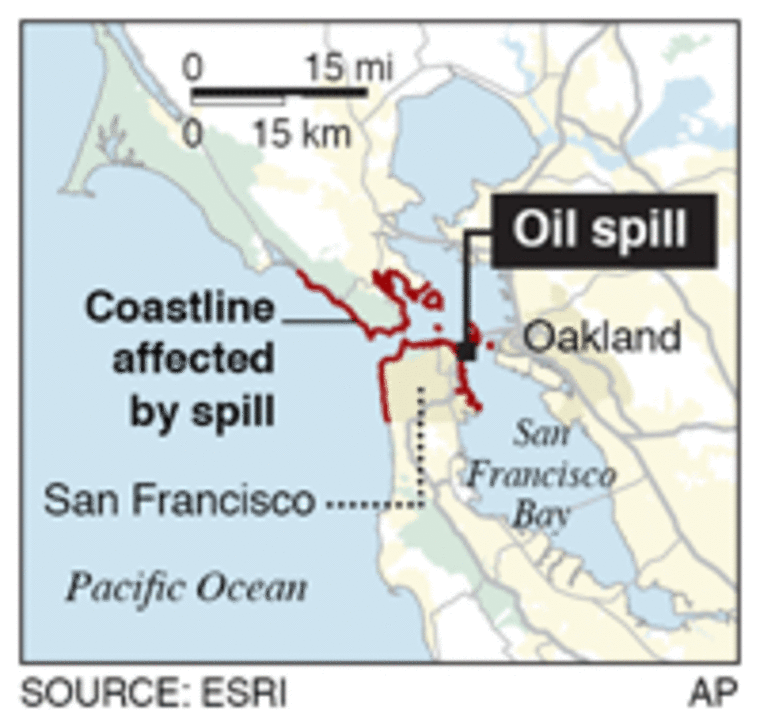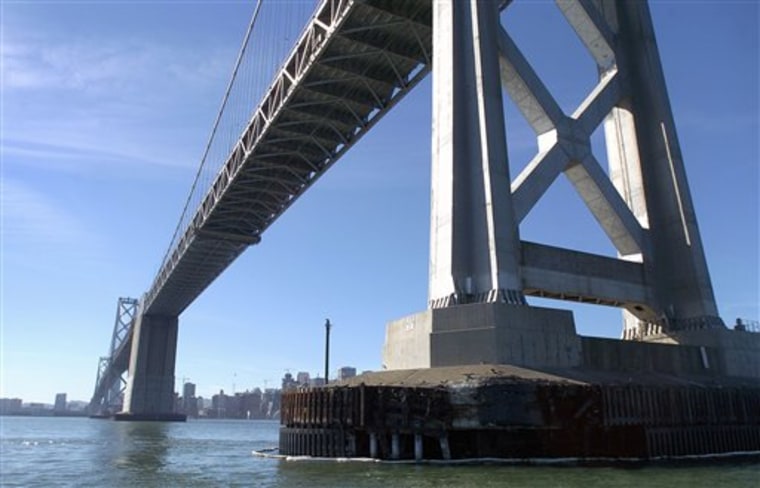A day after Gov. Arnold Schwarzenegger called last week’s San Francisco Bay oil spill an “unbelievable human failure,” the U.S. Coast Guard on Wednesday removed the officer overseeing the cleanup and said it would review its response to the crash.
The developments came as a federal investigator said the crew of the cargo ship that spilled the 58,000 gallons were refusing to speak.
Members of the Chinese crew have hired lawyers and are now declining to be questioned, said National Transportation Safety Board member Debbie Hersman. Some had spoken with Coast Guard officials earlier, but new criminal and civil investigations have apparently prompted the crew to refuse interviews, she said.
Moreover, the pilot who was guiding the ship has told investigators that he felt the ship's equipment was malfunctioning.
The Coast Guard review comes after criticism that it waited several hours to alert the public to the enormity of the spill.
Coast Guard Commandant Adm. Thad Allen announced the review. “I have determined that due to the severity of this incident and the potential benefits in identifying areas to improve response coordination and communication in the future, it is imperative that we get this review under way as quickly as possible,” he said in a statement.
The so-called Incident Specific Performance Review will include the city of San Francisco, the state of California and others.
At a Senate hearing in Washington later Wednesday, Allen said Capt. Paul Gugg will assume oversight of the response from Capt. William Uberti, who will remain the Coast Guard commander for the bay region.
“Given the concerns ... about what may or may not have happened, we thought it was best at this time to bring in a new incident commander for this particular response,” Allen said.
Schwarzenegger on Tuesday promised a thorough investigation into the accident and what he said was the Coast Guard’s slow response.
The governor also temporarily suspended all fishing in areas affected by the spill, delaying Thursday’s scheduled start of the highly anticipated commercial season for Dungeness crab. Fishermen worried about the spill had sought the delay.
“It’s not only heartbreaking but it is also outrageous,” said Schwarzenegger. “Then on top of it, it takes that long to react to the oil spill so by the time the next day comes around, the oil is all over the bay.”
Pilot's statements
The ship's instruments are emerging as focal points as the NTSB examines what caused the ship to sideswipe the San Francisco-Oakland Bay Bridge.
Earlier this week, the Coast Guard ruled out mechanical failure, pointing strongly to human error, including communication problems and “bridge-management issues” among a crew that was new to the ship.
But the NTSB, which took over the safety aspect of the accident, re-interviewed witnesses and participants under oath, and is studying the possibility of equipment problems, Hersman said.
One of the board’s first tasks was to re-interview pilot John Cota, among the most experienced of the seamen who guide ships through the bay. After lengthy sessions with Coast Guard investigators, he was questioned again for about three hours this week by the NTSB.
Cota has not spoken publicly since the accident killed hundreds of birds and forced the closing of beaches throughout the area. But in news briefings and in interviews with The Associated Press, the NTSB provided many details of the pilot’s account.
According to Cota, he grumbled to the ship’s captain about equipment that seemed faulty, but the captain’s replies reassured him enough that Cota guided the vessel out of its berth at the port of Oakland.
But as the 901-foot ship slipped into a bank of fog, the radar conked out, and confusion over the electronic charts surfaced at a critical moment, according to Cota’s account. Catastrophe struck moments later.
The NTSB emphasized that Cota’s account represents just one side of the story, and it is trying to verify his version of events with other witnesses, records and other evidence.
For instance, the NTSB brought in a private expert to analyze the radar and electronic charting devices, Hersman said. That analysis found no problems with the instruments, she said Wednesday.
NTSB experts are also analyzing the ship’s voyage data recorder, which captured radio transmissions and radar images that could validate Cota’s account.
'Tough questions' to be asked
The spill was the bay’s worst in nearly two decades.

“We have to really make sure that we investigate this thoroughly and to see also if we as a state can do more in order to prevent those kind of accidents,” Schwarzenegger said. “Believe me, we will ask the tough questions that need to be asked.”
Schwarzenegger also ordered the state Department of Public Health to determine whether people can become sick if they eat seafood caught in areas impacted by the fuel spilled by the cargo ship Cosco Busan.
The pilot of the ship said he immediately reported the presence of oil in the water, but cleanup crews didn’t arrive for nearly 90 minutes.
Coast Guard officials said their response was by the book, but concede mistakes in their communication with the public. Initial reports had the spill at just 140 gallons; the Coast Guard waited hours after learning it was really 58,000 gallons before notifying local officials.
A day after the oil spill, the governor praised the Coast Guard for taking “immediate action.” He later seemed to change course, but then after a briefing by Coast Guard officials at their command center on Treasure Island, Schwarzenegger sidestepped questions about whether he was satisfied with the agency’s response.
“I’m not an investigator,” he said.
Allen defended his agency’s response, saying he believed that crews were working so hard to respond to the spill that notifying city leaders and the public about its magnitude fell through the cracks.
One effect of the spill, he said, is that the Coast Guard may consider restricting movement of ships in heavy fog.
“If we had said you can’t leave until the fog clears, and that was 3 o’clock in the afternoon, looking back on it that would be preferable to the millions of dollars (the ship’s owners) are going to pay for response,” Allen said.
Rear Adm. Craig Bone, the top Coast Guard officer in California, said Monday that the owners and operators of the ship will unquestionably face civil penalties, and that criminal counts were a possibility.
Schwarzenegger signed an executive order suspending commercial and sport fishing until Dec. 1, or until state health officials decide it’s safe. The state Department of Fish and Game will determine which fishing areas will be affected by the order.
Commercial crab fishermen voted to ask for the delay Saturday. They are worried the crabs could be contaminated because ocean and bay water is used to keep the crustaceans alive in fishing boats after they’re harvested from the sea floor.
But the suspension will be an economic hardship for many fishermen, especially crabbers from Oregon, Washington and California’s distant North Coast. The Bay Area crab fishery attracts out-of-town fishermen because it opens two weeks earlier than larger fisheries farther north.
“It will set us back quite a bit,” said Art Romine, 38, of Newport, Ore., who was planning to head back with his shipmates Tuesday. Still, he agreed with Schwarzenegger’s decision.
“We can’t be bringing in crabs that are possibly toxic,” Romine said. “That wouldn’t be good for the market at all. People don’t want to buy toxic food.”
While nowhere near as large as the 11 million gallons spilled in the 1989 Exxon Valdez disaster, Wednesday’s spill was the biggest in the area since 1988, when 400,000 gallons of oil spilled after a Shell refinery drain line broke. Another spill in 1996 poured 40,000 gallons of oil into the bay from a military vessel near Pier 70.
The Cosco Busan is being detained at the Port of Oakland.
Any charges — civil or criminal — would likely fall under the negligence provisions of the Clean Water Act and the U.S. transportation code.
